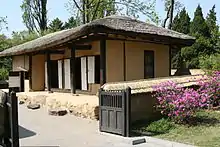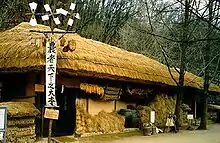Choga (architecture)
Choga (Korean: 초가; Hanja: 草家) denotes one of two traditional nature-friendly house types in Korea. The main building materials used to build these houses are straw, wood and soil.[1][2]

Kim Il Sung's Choga near Pyongyang

Choga in Korean Folk Village in South Korea
Choga roofs were especially popular among farmers and low-income classes in traditional Korean society.[3] Certain plants, such as gourds and pumpkins, could be grown on top of Choga roofs. One of the major disadvantages of the materials used, in particular rice straw, was that it could rot quickly when exposed to the elements.[4]
See also
References
- Yoo, Myeonng-jong (2008). 100 Cultural Symbols of Korea (1 ed.). 431, king’s garden office hotel 3rd complex, 72, naesoo-dong, Jongno-gu. seoul, korea: Discovery Media. p. 96.CS1 maint: location (link)
- "Korean House". Dangoon.
- Jackson, Ben; Koehler, Robert (2015). Korean Architecture: Breathing with Nature. Seoul, South Korea: Seoul Selection. p. 122. ISBN 9781624120473.
- Jackson, Ben; Koehler, Robert (2015). Korean Architecture: Breathing with Nature. Seoul, South Korea: Seoul Selection. p. 122. ISBN 9781624120473.
This article is issued from Wikipedia. The text is licensed under Creative Commons - Attribution - Sharealike. Additional terms may apply for the media files.